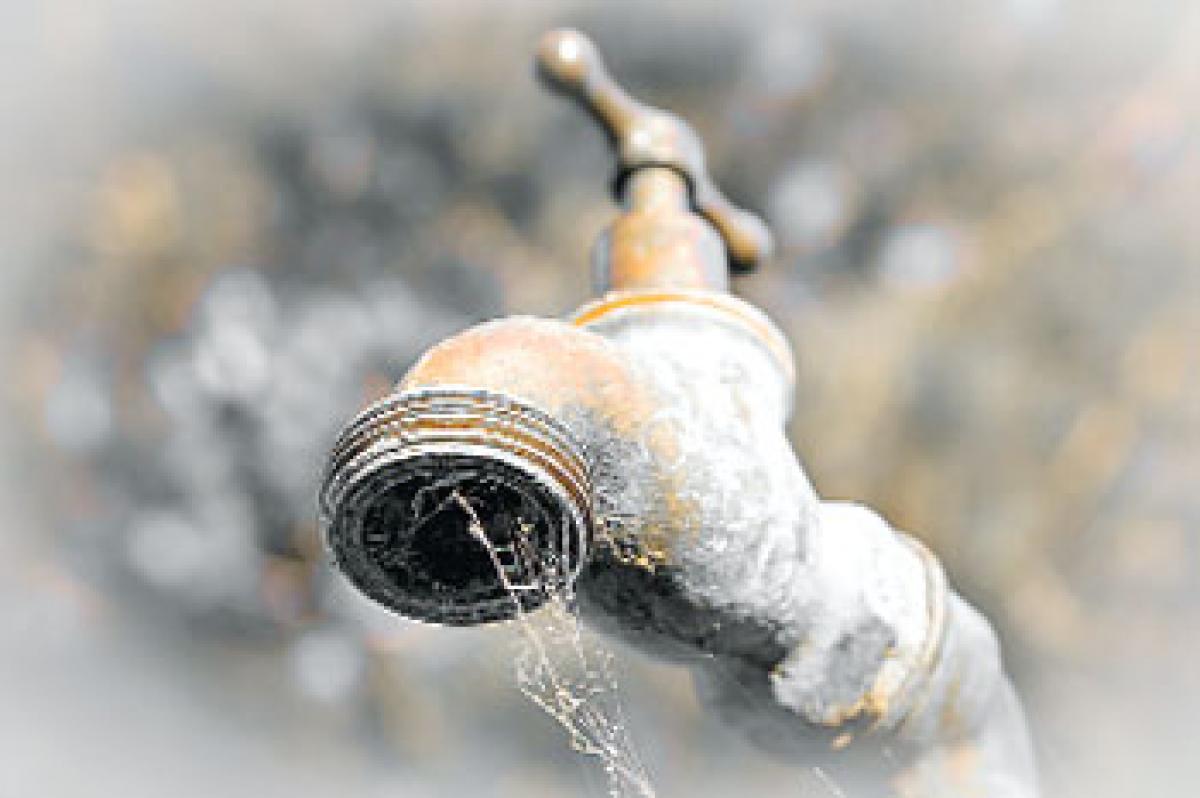Live
- Uphold prestige of Assembly: Pawan
- Children are nation's future, says Revanth
- SC junks plea to ban WhatsApp
- RRR elected Assembly Dy Speaker unopposed
- Cong wants separate Constitution in J&K
- Modi never read Constitution, hence it is blank for him: Rahul
- AP: Global destination
- Tulsi Gabbard on National Intel
- Tribal women from Lagacharla seek KTR’s support
- India vs Malaysia FIFA Friendly Match Poster Unveiled by CM
Just In

x
Highlights
The plight of the Secunderabad Cantonment Board (SCB) is akin to the farmers in debt. By the time a portion of debt is cleared, another huge amount along with interest has raises its head.
In spite of bringing the arrears payable to the Water Board from Rs 36 crore to Rs 20 crore in the last nine months, the Secunderabad Cantonment Board still seems to be in a fix
Demand and supply
- SCB needs 60 lakh gallons of water per day
- It gets 38-40 lakh gallons of water per day
- SCB has a total storage capacity of 38 lakh gallons in the form of intake sumps and elevated level service reservoirs
- SCB collects Rs 95 lakh to 1 crore per month towards water bills and pays Rs 1.4 crore to the Water Board every month towards charges
 The plight of the Secunderabad Cantonment Board (SCB) is akin to the farmers in debt. By the time a portion of debt is cleared, another huge amount along with interest has raises its head.
The plight of the Secunderabad Cantonment Board (SCB) is akin to the farmers in debt. By the time a portion of debt is cleared, another huge amount along with interest has raises its head.In July the water bill arrears payable to Hyderabad Metropolitan Water Supply and Sewerage Board (HMWSSB) was over Rs 20 crore (see box for details). Now, along with interest, it has increased to over Rs 21 crore.
The SCB has a storage capacity of 38 lakh gallons in the form of intake sumps and elevated level service reservoirs. It needs 60 lakh gallons of water per day but receives about 38-40 lakh gallons from the Water Board.
Every month the SCB pays Rs 1.4 crore to HMWSSB towards water charge but is unable to clear the arrears, which are increasing with Rs 25 lakh interest imposed every month.M Rajkumar, superintendent, Water Wing, SCB said, “In the last nine months the arrears which stood at Rs 36 crore was brought down to Rs 18 crore. Efforts are being made to streamline the illegal connections and increase revenue.”
In the last one year, about 5,000 illegal connections were streamlined and now there are 20,200 legal connections in the SCB limits. However, there are still close to 3,000 illegal connections that need to be streamlined for which bill collectors are moving from one ward to another.
The residents of the Secunderabad Cantonment are dependent heavily on water tankers. Hema, a resident of Alwal said, “We set aside a budget for private water tankers. The water supply is erratic. If not for the private water tankers we would have no water.”
The SCB has been putting up a case not to levy commercial tariff on the residents of the Cantonment to the Water Board.
Tricky situation in slums
The SCB officials are facing a tricky situation in the 23–odd slums as people just refuse to pay up. Officials too are reluctant due to the possible threat that the illegal occupants would claim land rights later if a bill is issued.
A senior official on condition of anonymity said, “On humanitarian grounds water is supplied once in seven to eight days. In most of the slums the dwellers have encroached land.” There are more than 3,000 illegal connections in wards 4 and 7. Political interference and refusal to fall in line are making bill collectors to stay away from slums.
Domestic arrears
The domestic arrears are Rs 8 crore that are pending for over a decade. Bill collectors have been visiting door-to-door and delivering bills in a bid to recover the dues. A senior official said that about 150 colonies get the bills and people are prompt.
Meanwhile, residents of the cantonment say that they were ready to pay bills provided they receive them. S Sainath, a resident of Jalal Gardens in West Marredpally said, “It is years since I received the bill and when I made a trip to the SCB office there were no officials in their seat. I just gave up as I need to take half a day leave each time I go to the office.”
Another resident of Ishaq Colony Mahender said, “Presently, the SCB sends bills once in three months. It would be better if the board makes it a monthly affair.” Officials at the SCB say that there are many residing in slums especially in Rasoolpura, which has a population of about 30,000, who are not paying drinking water bills for years.
By:T P Venu

Next Story
More Stories
ADVERTISEMENT
© 2024 Hyderabad Media House Limited/The Hans India. All rights reserved. Powered by hocalwire.com







